Pickpocket – Criterion Collection: Cinema History on Blu-ray
Criterion Collection released a Blu-ray edition of
Pickpocket this week, so in conjunction with this week's
DISCussion, here is the full length review of the film and the bonus features.
Robert Bresson’s revolutionary character study,
Pickpocket, is one of the prolific director’s best films, and in turn, one of the greatest films in history. This dark and visceral drama is a study of humanity and self-expression.
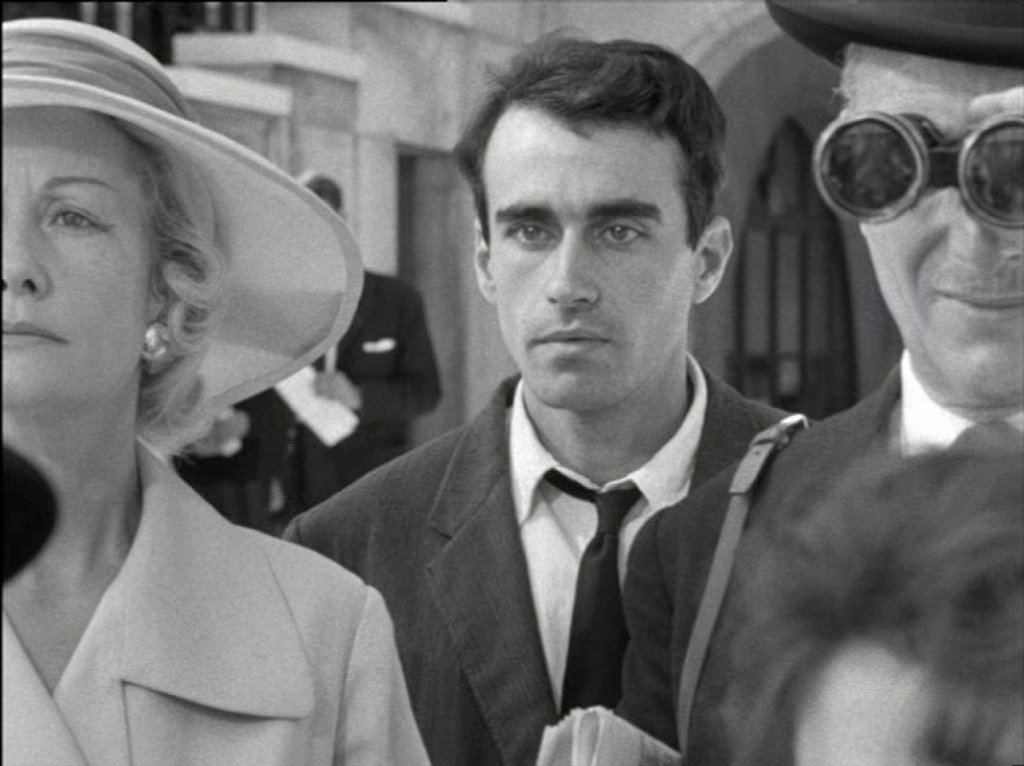 Pickpocket
Pickpocket begins with one of many narrative scenes that include an emphasized “triple” narrative structure. Michel (Martin LaSalle) details an event in his journal that the audience reads, while he vocally narrates the writing; Bresson then cuts to the scene that Michel described, and the audience watches the action take place. In utilizing this complex structure, Bresson is able to accentuate these pivotal moments in a natural way, and allow the story to retain its fluidity. The story of
Pickpocket follows Michel on his quest for self discovery on the fringes of mid-twentieth-century France. Michel is a competent and talented young man, yet his ego does not allow him to participate in the various mundane employment opportunities that surround him. In his first journal entry, we see Michel getting arrested for stealing money at a horse race. This begins his descent into the world of pickpocketing, and his eventual partnership with a fellow “craftsman”. Although Michel has the support of friends, he refuses their advice, and continues on his quest for meaning. He constantly trains to become a more capable thief; testing methods of pulling wallets out of his hung-up jacket, or taking a wristwatch off the leg of a table. Michel shows that when he is able to concentrate on something, perhaps for the first time in his life, that he can actually succeed and excel in it.
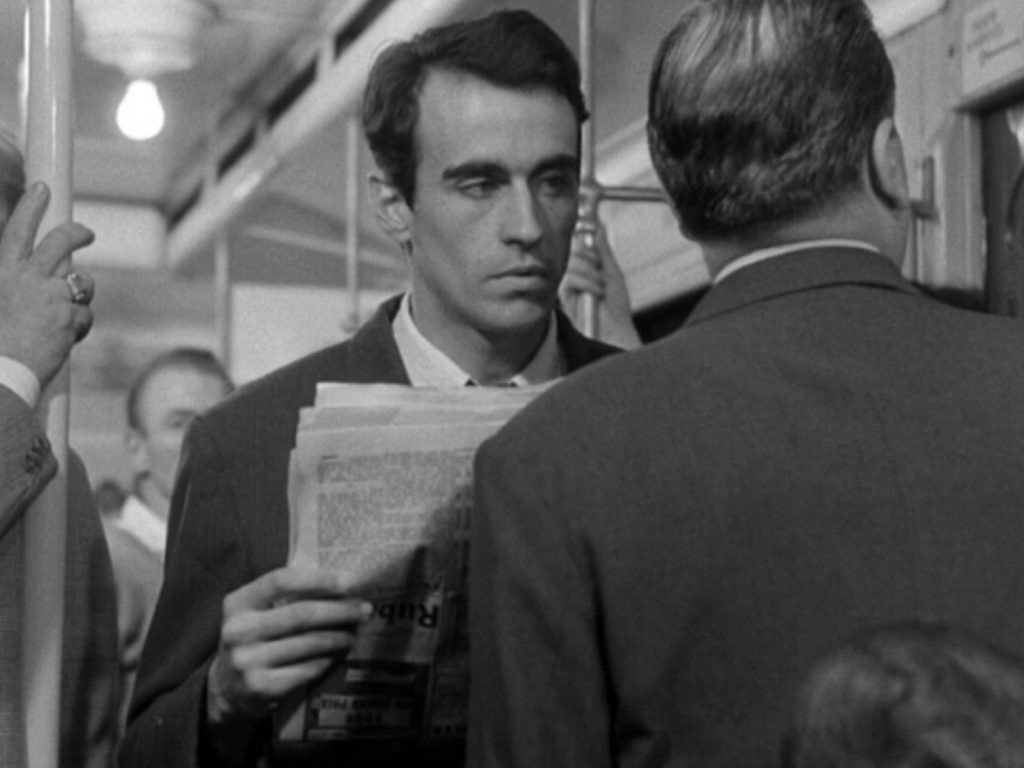
Bresson is famous for using unknown actors (only using them once), and forcing them to strip away any sense of “performance” from their work. This allows him to capture the raw emotion and poetry of a scene, without being influenced by the actors. Martin LaSalle's, Michel, is a testament to the power of this style of direction. LaSalle's cold and uncaring disposition in the film is in striking opposition to his friends and conventional acting models. In the film, Michel gets arrested, buries his mother, escapes police capture and falls in love; yet he faces all of these situations with the same, emotionally-devoid, expressionless face. Therein lies the power in Bresson's complex and beautiful work; the audience still develops an attachment for this detestable character, yet the character hardly seems human. Bresson uses his incredible cinematography and editing to give this film its emotional weight, and allows his audience to think outside of their own experiences.
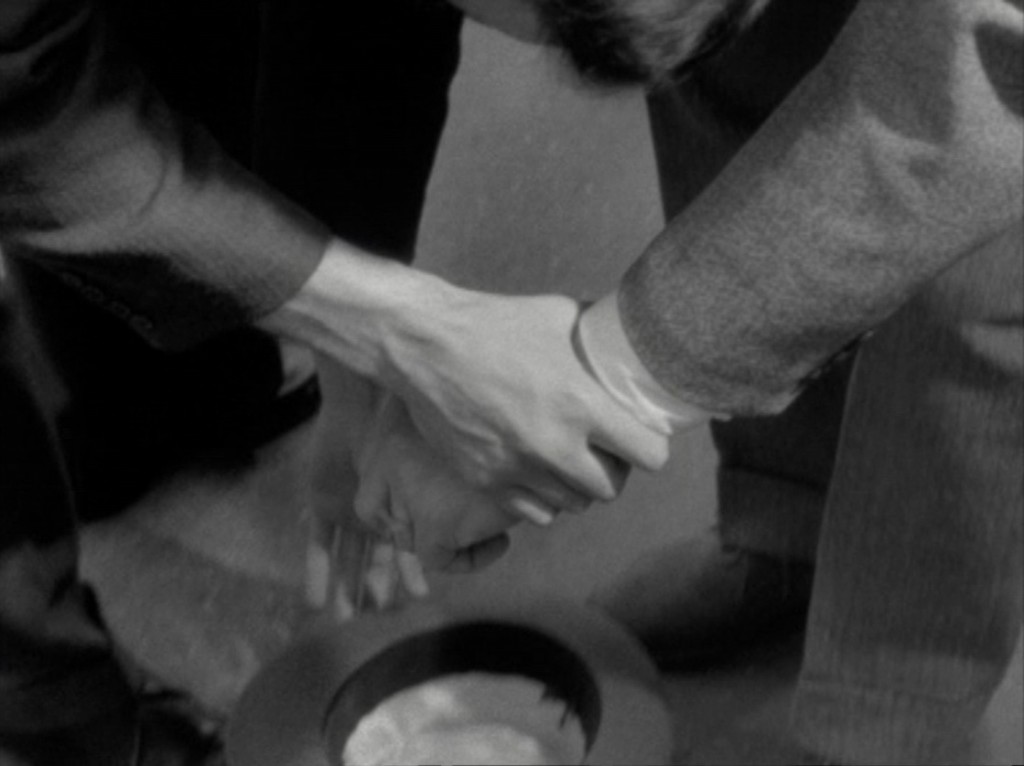 Pickpocket
Pickpocket is the exploration of human nature. Michel represents the untapped potential of society that is often overlooked due to politics or social standing. He represents the revulsion that most have when they reach adulthood to find that working life seems to be an unending stream of meaningless days, strung together to create a “career”. He represents idealism in his refusal to give up his talents for a more conventional approach to life. In the film, Michel introduces the notion that “A certain group of 'supermen' who possess talent, intelligence or genius, be allowed, in certain cases, to disobey laws”. He believes, as many young people do, that his gifts are paramount to that of general society, and his illicit activities can only prove as the basis for his future greatness. Michel is the frustrated, existential creation of Bresson that makes his audience identify with the subject matter in a way that makes it incredibly realistic. Michel is lashing out against a rigid society that favors obedience in place of creativity and intelligence, in an attempt to break the mold.
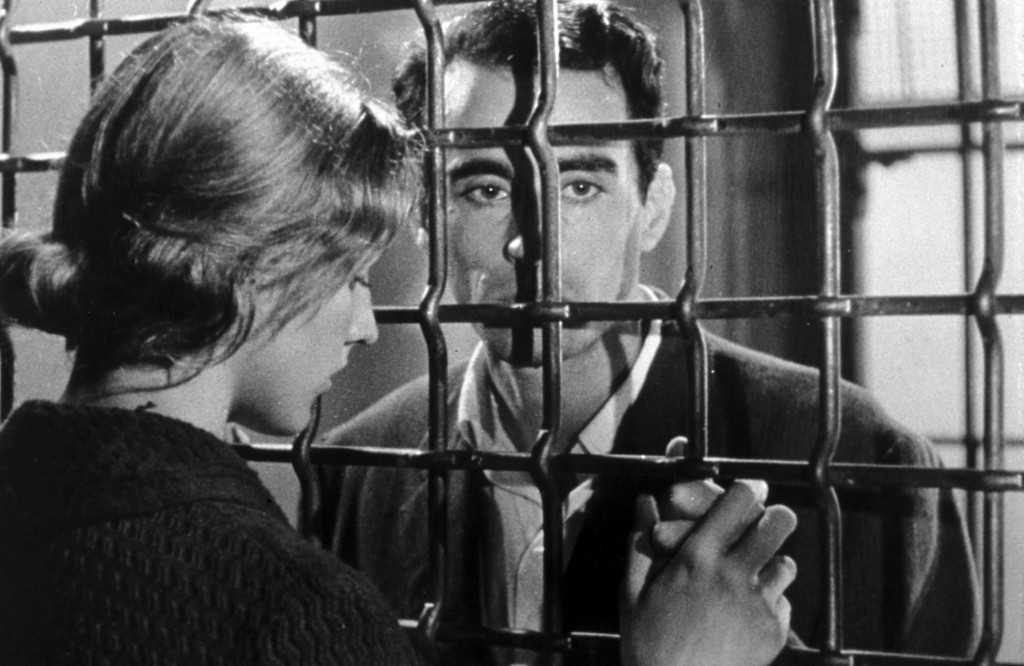
While the central themes of
Pickpocket are based around humanity, Bresson also offers an ancillary idea of the absurdity of life. As the film follows Michel, it is wholly consumed with his thoughts of pickpocketing, yet his mother's caregiver, Jeanne (Marika Green) ingratiates herself to him, and becomes a continually more-pronounced fixture in his life. Bresson never shows any intimacy between the two, and focuses mainly on their mutual disinterest. Yet it is Jeanne's love that offers Michel the ultimate redemption, and makes his twisted and bizarre path to her heart, worthwhile.
Bresson begins this near-perfect film with a warning to his unsuspecting audience that reads: “The style of this film is not that of a thriller. Using images and sound, the filmmaker strives to express the nightmare of a young man whose weaknesses lead him to commit acts of theft for which nothing destined him. However, this adventure, and the strange paths it takes, brings together two souls that may otherwise never have met”. Bresson offers his completely unique perspective of the directionless nature of life, and the often-times unintended outcomes of the paths we take.
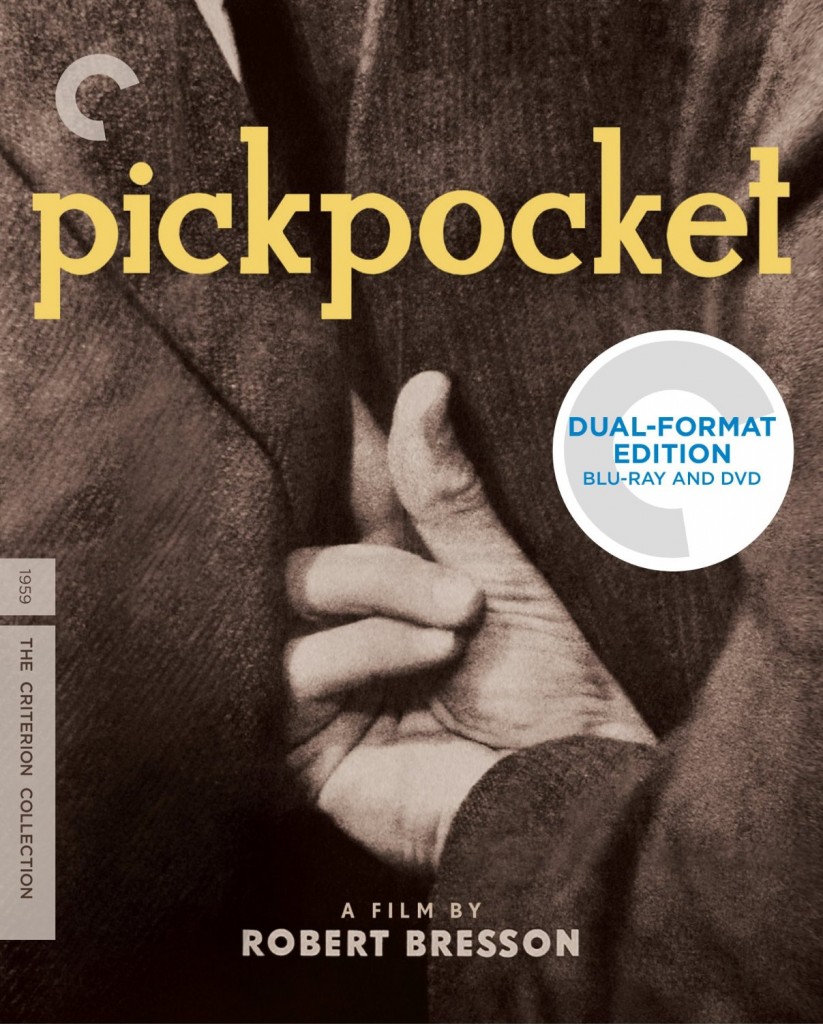
The Criterion edition of this film is superb. The 2K digital restoration looks sharp and crisp, and the sound is clear and less pitted than the versions I have previously viewed. For a duel-edition Blu-ray/DVD, I was surprised to see this in a clear hardcover case, and not the traditional cardboard. It fits nicely on the shelf, so I'm not complaining. Inside the case is a fold-out essay written by film critic, Gary Indiana. The supplements on the disk are varied, and some are quite long. The introduction by screenwriter, Paul Schrader is fantastic, as
Pickpocket is the film that lead him to his career as a writer. Criterion has even included their polite version of the “Warning: Spoilers” tag, as Schrader gives an in-depth overview of the entire movie, ending included. The documentary,
The Models of “Pickpocket” is also very interesting, as it explores the lives of Bresson's “actors” after their debut roles. Their complete anonymity is compelling to watch as Bresson only used common people in his films, and never used them twice. For someone to be a part of such a pivotal film, and then go back to lead a normal life, is a completely bizarre juxtaposition against today's climate of the idolization of celebrities. The supplements also include two television spots, one an interview with Bresson, and the other, a performance by slight-of-hand performer, Kassagi. The Bresson interview is a wonderful little six minute talk with Bresson and two anchors (with varying opinions about the film). It is fascinating to watch Bresson justify his approach to film, and his reasoning behind it. Of the additional material, I think I enjoyed the Kassagi performance the most. As the pickpocketing consultant on the film (and in the film), Kassagi puts on an incredibly entertaining show, stealing from his audience, and performing hokey magic tricks.
If you are at all a fan of French New Wave cinema, Bresson or cinematic master-works, you have likely already purchased this gem. If not, do yourself a favor, and watch it with your Hulu Plus membership, or rent it on Amazon instant; you will not be disappointed.
Pros
- Beautiful Cinematography
- A Grippingly Powerful Masterpiece
- Truly Revolutionary Piece of Cinema
- Excellent Restoration
- Interesting and Relevant Supplements
 Pickpocket begins with one of many narrative scenes that include an emphasized “triple” narrative structure. Michel (Martin LaSalle) details an event in his journal that the audience reads, while he vocally narrates the writing; Bresson then cuts to the scene that Michel described, and the audience watches the action take place. In utilizing this complex structure, Bresson is able to accentuate these pivotal moments in a natural way, and allow the story to retain its fluidity. The story of Pickpocket follows Michel on his quest for self discovery on the fringes of mid-twentieth-century France. Michel is a competent and talented young man, yet his ego does not allow him to participate in the various mundane employment opportunities that surround him. In his first journal entry, we see Michel getting arrested for stealing money at a horse race. This begins his descent into the world of pickpocketing, and his eventual partnership with a fellow “craftsman”. Although Michel has the support of friends, he refuses their advice, and continues on his quest for meaning. He constantly trains to become a more capable thief; testing methods of pulling wallets out of his hung-up jacket, or taking a wristwatch off the leg of a table. Michel shows that when he is able to concentrate on something, perhaps for the first time in his life, that he can actually succeed and excel in it.
Pickpocket begins with one of many narrative scenes that include an emphasized “triple” narrative structure. Michel (Martin LaSalle) details an event in his journal that the audience reads, while he vocally narrates the writing; Bresson then cuts to the scene that Michel described, and the audience watches the action take place. In utilizing this complex structure, Bresson is able to accentuate these pivotal moments in a natural way, and allow the story to retain its fluidity. The story of Pickpocket follows Michel on his quest for self discovery on the fringes of mid-twentieth-century France. Michel is a competent and talented young man, yet his ego does not allow him to participate in the various mundane employment opportunities that surround him. In his first journal entry, we see Michel getting arrested for stealing money at a horse race. This begins his descent into the world of pickpocketing, and his eventual partnership with a fellow “craftsman”. Although Michel has the support of friends, he refuses their advice, and continues on his quest for meaning. He constantly trains to become a more capable thief; testing methods of pulling wallets out of his hung-up jacket, or taking a wristwatch off the leg of a table. Michel shows that when he is able to concentrate on something, perhaps for the first time in his life, that he can actually succeed and excel in it.
 Bresson is famous for using unknown actors (only using them once), and forcing them to strip away any sense of “performance” from their work. This allows him to capture the raw emotion and poetry of a scene, without being influenced by the actors. Martin LaSalle's, Michel, is a testament to the power of this style of direction. LaSalle's cold and uncaring disposition in the film is in striking opposition to his friends and conventional acting models. In the film, Michel gets arrested, buries his mother, escapes police capture and falls in love; yet he faces all of these situations with the same, emotionally-devoid, expressionless face. Therein lies the power in Bresson's complex and beautiful work; the audience still develops an attachment for this detestable character, yet the character hardly seems human. Bresson uses his incredible cinematography and editing to give this film its emotional weight, and allows his audience to think outside of their own experiences.
Bresson is famous for using unknown actors (only using them once), and forcing them to strip away any sense of “performance” from their work. This allows him to capture the raw emotion and poetry of a scene, without being influenced by the actors. Martin LaSalle's, Michel, is a testament to the power of this style of direction. LaSalle's cold and uncaring disposition in the film is in striking opposition to his friends and conventional acting models. In the film, Michel gets arrested, buries his mother, escapes police capture and falls in love; yet he faces all of these situations with the same, emotionally-devoid, expressionless face. Therein lies the power in Bresson's complex and beautiful work; the audience still develops an attachment for this detestable character, yet the character hardly seems human. Bresson uses his incredible cinematography and editing to give this film its emotional weight, and allows his audience to think outside of their own experiences.
 Pickpocket is the exploration of human nature. Michel represents the untapped potential of society that is often overlooked due to politics or social standing. He represents the revulsion that most have when they reach adulthood to find that working life seems to be an unending stream of meaningless days, strung together to create a “career”. He represents idealism in his refusal to give up his talents for a more conventional approach to life. In the film, Michel introduces the notion that “A certain group of 'supermen' who possess talent, intelligence or genius, be allowed, in certain cases, to disobey laws”. He believes, as many young people do, that his gifts are paramount to that of general society, and his illicit activities can only prove as the basis for his future greatness. Michel is the frustrated, existential creation of Bresson that makes his audience identify with the subject matter in a way that makes it incredibly realistic. Michel is lashing out against a rigid society that favors obedience in place of creativity and intelligence, in an attempt to break the mold.
Pickpocket is the exploration of human nature. Michel represents the untapped potential of society that is often overlooked due to politics or social standing. He represents the revulsion that most have when they reach adulthood to find that working life seems to be an unending stream of meaningless days, strung together to create a “career”. He represents idealism in his refusal to give up his talents for a more conventional approach to life. In the film, Michel introduces the notion that “A certain group of 'supermen' who possess talent, intelligence or genius, be allowed, in certain cases, to disobey laws”. He believes, as many young people do, that his gifts are paramount to that of general society, and his illicit activities can only prove as the basis for his future greatness. Michel is the frustrated, existential creation of Bresson that makes his audience identify with the subject matter in a way that makes it incredibly realistic. Michel is lashing out against a rigid society that favors obedience in place of creativity and intelligence, in an attempt to break the mold.
 While the central themes of Pickpocket are based around humanity, Bresson also offers an ancillary idea of the absurdity of life. As the film follows Michel, it is wholly consumed with his thoughts of pickpocketing, yet his mother's caregiver, Jeanne (Marika Green) ingratiates herself to him, and becomes a continually more-pronounced fixture in his life. Bresson never shows any intimacy between the two, and focuses mainly on their mutual disinterest. Yet it is Jeanne's love that offers Michel the ultimate redemption, and makes his twisted and bizarre path to her heart, worthwhile.
Bresson begins this near-perfect film with a warning to his unsuspecting audience that reads: “The style of this film is not that of a thriller. Using images and sound, the filmmaker strives to express the nightmare of a young man whose weaknesses lead him to commit acts of theft for which nothing destined him. However, this adventure, and the strange paths it takes, brings together two souls that may otherwise never have met”. Bresson offers his completely unique perspective of the directionless nature of life, and the often-times unintended outcomes of the paths we take.
While the central themes of Pickpocket are based around humanity, Bresson also offers an ancillary idea of the absurdity of life. As the film follows Michel, it is wholly consumed with his thoughts of pickpocketing, yet his mother's caregiver, Jeanne (Marika Green) ingratiates herself to him, and becomes a continually more-pronounced fixture in his life. Bresson never shows any intimacy between the two, and focuses mainly on their mutual disinterest. Yet it is Jeanne's love that offers Michel the ultimate redemption, and makes his twisted and bizarre path to her heart, worthwhile.
Bresson begins this near-perfect film with a warning to his unsuspecting audience that reads: “The style of this film is not that of a thriller. Using images and sound, the filmmaker strives to express the nightmare of a young man whose weaknesses lead him to commit acts of theft for which nothing destined him. However, this adventure, and the strange paths it takes, brings together two souls that may otherwise never have met”. Bresson offers his completely unique perspective of the directionless nature of life, and the often-times unintended outcomes of the paths we take.
 The Criterion edition of this film is superb. The 2K digital restoration looks sharp and crisp, and the sound is clear and less pitted than the versions I have previously viewed. For a duel-edition Blu-ray/DVD, I was surprised to see this in a clear hardcover case, and not the traditional cardboard. It fits nicely on the shelf, so I'm not complaining. Inside the case is a fold-out essay written by film critic, Gary Indiana. The supplements on the disk are varied, and some are quite long. The introduction by screenwriter, Paul Schrader is fantastic, as Pickpocket is the film that lead him to his career as a writer. Criterion has even included their polite version of the “Warning: Spoilers” tag, as Schrader gives an in-depth overview of the entire movie, ending included. The documentary, The Models of “Pickpocket” is also very interesting, as it explores the lives of Bresson's “actors” after their debut roles. Their complete anonymity is compelling to watch as Bresson only used common people in his films, and never used them twice. For someone to be a part of such a pivotal film, and then go back to lead a normal life, is a completely bizarre juxtaposition against today's climate of the idolization of celebrities. The supplements also include two television spots, one an interview with Bresson, and the other, a performance by slight-of-hand performer, Kassagi. The Bresson interview is a wonderful little six minute talk with Bresson and two anchors (with varying opinions about the film). It is fascinating to watch Bresson justify his approach to film, and his reasoning behind it. Of the additional material, I think I enjoyed the Kassagi performance the most. As the pickpocketing consultant on the film (and in the film), Kassagi puts on an incredibly entertaining show, stealing from his audience, and performing hokey magic tricks.
If you are at all a fan of French New Wave cinema, Bresson or cinematic master-works, you have likely already purchased this gem. If not, do yourself a favor, and watch it with your Hulu Plus membership, or rent it on Amazon instant; you will not be disappointed.
The Criterion edition of this film is superb. The 2K digital restoration looks sharp and crisp, and the sound is clear and less pitted than the versions I have previously viewed. For a duel-edition Blu-ray/DVD, I was surprised to see this in a clear hardcover case, and not the traditional cardboard. It fits nicely on the shelf, so I'm not complaining. Inside the case is a fold-out essay written by film critic, Gary Indiana. The supplements on the disk are varied, and some are quite long. The introduction by screenwriter, Paul Schrader is fantastic, as Pickpocket is the film that lead him to his career as a writer. Criterion has even included their polite version of the “Warning: Spoilers” tag, as Schrader gives an in-depth overview of the entire movie, ending included. The documentary, The Models of “Pickpocket” is also very interesting, as it explores the lives of Bresson's “actors” after their debut roles. Their complete anonymity is compelling to watch as Bresson only used common people in his films, and never used them twice. For someone to be a part of such a pivotal film, and then go back to lead a normal life, is a completely bizarre juxtaposition against today's climate of the idolization of celebrities. The supplements also include two television spots, one an interview with Bresson, and the other, a performance by slight-of-hand performer, Kassagi. The Bresson interview is a wonderful little six minute talk with Bresson and two anchors (with varying opinions about the film). It is fascinating to watch Bresson justify his approach to film, and his reasoning behind it. Of the additional material, I think I enjoyed the Kassagi performance the most. As the pickpocketing consultant on the film (and in the film), Kassagi puts on an incredibly entertaining show, stealing from his audience, and performing hokey magic tricks.
If you are at all a fan of French New Wave cinema, Bresson or cinematic master-works, you have likely already purchased this gem. If not, do yourself a favor, and watch it with your Hulu Plus membership, or rent it on Amazon instant; you will not be disappointed.